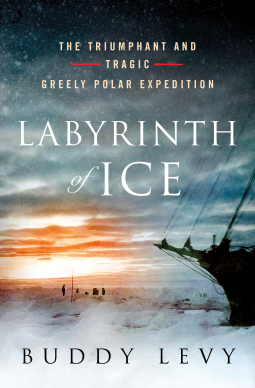
Labyrinth of Ice
The Triumphant and Tragic Greely Polar Expedition
by Buddy Levy
This title was previously available on NetGalley and is now archived.
Send NetGalley books directly to your Kindle or Kindle app
1
To read on a Kindle or Kindle app, please add kindle@netgalley.com as an approved email address to receive files in your Amazon account. Click here for step-by-step instructions.
2
Also find your Kindle email address within your Amazon account, and enter it here.
Pub Date Dec 03 2019 | Archive Date Feb 28 2020
Description
National Outdoor Book Awards Winner
Winner of the BANFF Adventure Travel Award
“A thrilling and harrowing story. If it’s a cliche to say I couldn’t put this book down, well, too bad: I couldn’t put this book down.” —Jess Walter, bestselling author of Beautiful Ruins
“Polar exploration is utter madness. It is the insistence of life where life shouldn’t exist. And so, Labyrinth of Ice shows you exactly what happens when the unstoppable meets the unmovable. Buddy Levy outdoes himself here. The details and story are magnificent.” —Brad Meltzer, bestselling author of The First Conspiracy: The Secret Plot to Kill George Washington
Based on the author's exhaustive research, the incredible true story of the Greely Expedition, one of the most harrowing adventures in the annals of polar exploration.
In July 1881, Lt. A.W. Greely and his crew of 24 scientists and explorers were bound for the last region unmarked on global maps. Their goal: Farthest North. What would follow was one of the most extraordinary and terrible voyages ever made.
Greely and his men confronted every possible challenge—vicious wolves, sub-zero temperatures, and months of total darkness—as they set about exploring one of the most remote, unrelenting environments on the planet. In May 1882, they broke the 300-year-old record, and returned to camp to eagerly await the resupply ship scheduled to return at the end of the year. Only nothing came.
250 miles south, a wall of ice prevented any rescue from reaching them. Provisions thinned and a second winter descended. Back home, Greely’s wife worked tirelessly against government resistance to rally a rescue mission.
Months passed, and Greely made a drastic choice: he and his men loaded the remaining provisions and tools onto their five small boats, and pushed off into the treacherous waters. After just two weeks, dangerous floes surrounded them. Now new dangers awaited: insanity, threats of mutiny, and cannibalism. As food dwindled and the men weakened, Greely's expedition clung desperately to life.
Labyrinth of Ice tells the true story of the heroic lives and deaths of these voyagers hell-bent on fame and fortune—at any cost—and how their journey changed the world.
Available Editions
| EDITION | Other Format |
| ISBN | 9781250182197 |
| PRICE | $29.99 (USD) |
| PAGES | 400 |
Average rating from 29 members
Featured Reviews
 Teresa Y, Reviewer
Teresa Y, Reviewer
I have read several absolutely awesome historical true stories and I really didn’t think Indianapolis or Lost in Shangri-La could be beat, but this one blew me away!!! Mr. Levy certainly did his homework, the research was meticulous and the author certainly knows how to keep you engaged. The first chapter of the book draws you in, and then the story never lets you go. My review will not be able to get close to describing the feelings and emotions this story makes you feel. I was brought to tears several times.
What a remarkable man Lt. A.W. Greely was and the dedication, courage, bravery and resilience all of his team showed thru the challenges they endured was remarkable. I loved the way this book was written; it followed the diaries of the men involved and there was never a lull or any extra wordage. It was told perfectly.
I had to keep reminding myself this was all taking place between 1881 to 1884. One of the most surprising things I found was the media coverage, it was no different in 1885 than it is today, the media chooses to believe the worst and to highlight “fake news” overlooking the true sacrifices and actual events that really took place, not caring if the reputation of true heroes are tarnished. I give this book the highest 5 stars I can give. You will not be disappointed, pick it up, read it, another book going into my top ten best books ever!!
I was given the opportunity to receive this book from St. Martin’s Press through NetGalley. The opinions expressed in this review are completely my own. This one gets the highest 5*****’s I can give!! An awesome book!!
In 1881, American Lt. A. W. Greely and a team of scientists went on a journey to pass the record of reaching furthest North. Buddy Levy's new book Labyrinth of Ice takes readers on their journey of glory and horror. The men accomplished their mission of reaching furthest North and contributing important scientific data. They were also stranded over two winters with dwindling supplies.
Before the astronauts and space exploration, men of courage and vision took on the vast frozen spaces of ice, seeking fame, glory, short-cut passages, and scientific knowledge. They were the heroes of their day.
Labyrinth of Ice was a bone-chilling read. I felt I knew these men and suffered with them. The bravery and selflessness of some were offset by a self-seeking thief. Madness and despair were found alongside clear-thinking and innovative thinkers. When their supply and rescue ships failed to arrive, Greely struggled to keep the team disciplined, in good spirits--and alive as they suffered life-threatening conditions and starvation. Lady Greely, extremely self-educated in Arctic literature, pressured the government to send out rescue ships.
Eleven men had died before they were finally found. Public opinion turned from adulation to revulsion when rumors of cannibalism circulated the newspapers. The survivors went on to illustrious careers.
I was given access to a free ebook by the publisher through NetGalley. My review is fair and unbiased.
 Beata B, Reviewer
Beata B, Reviewer
*A big thank-you to Buddy Levy, St. Martin's Press and NetGalley for a copy in exchange for my honest review.*
This book will definitely become a must-read for everybody, like myself, interested in the exploration of the Arctic. Having read earlier about two most famous attempts by John Franklin and George De Long to explore the only then uncharted and most mysterious part of our planet, I was delighted to have received a book that covers yet another polar expedition. Lt. Adolphus Greely undertook in 1881 the mission to collect the meteorological and geographical data of the Arctic. The expedition was well planned and prepared, however, the severe climate and unexpected events forced Lt. Greenly and his crew of 24 to leave Fort Conger, their base, when they realized that ships which were meant to take them back home would not arrive.
Buddy Levy drew on personal letters, diaries and all authentic mateirlas wile writing his book, and the effect is remarkable. His talent to tell the story of the brave men who fought against the nature makes this non-fiction a book that can only generate awe and admiration for the explorers and their will to survive till the very end.
The exploration ended in 1884, unfortunately, several of Lt. Greely's men paid the highest price for their courage.
Labirynth of Ice is definitely one of the best non-fiction I have read this year. It is a story of courage, survival and mutual support in the most inhospitable environment.
Labyrinth of Ice is Buddy Levy's gift to the world of non-fiction in 2019: a rich and moving testament to a lost era of heroic sacrifice in the name of exploration of the unknown, brutal endurance, and patriotism. Levy takes us back with cinematic narrative to the Greely Polar Expedition of 1881-1883: the attempt to attain Farthest North and take continual scientific readings of the harsh unmarked ice for the advancement of the polar knowledge of the United States.
Levy draws from journals from expedition leader Adolphus Greely and his crew of 24 to tell their stories as they triumph in their pursuit of unmapped land and their eventual failed rescue, abandonment, and dwindling rations. This surfeit of first hand source material gives Levy's narrative a human connection lacking in some extreme adventure narratives, as the reader is drawn into the roller coaster emotions and tribulations of each of the men. As with the most brutal of polar expeditions I've read about, Greely and his men face unimaginable cold temperatures, exposure, shifting ice, scarce rations, potential mutiny, and madness in their attempt to survive long enough to return home.
This is a book that begs to be read by any fan of adventure, exploration, and trials of the human spirit. Greely and (the majority) of his men are rightfully remembered as American heroes, and I can only applaud Buddy Levy for penning such an enthralling tale of their exploits in the cold polar wastes.
**I was given a copy of this book by the publisher via NetGalley in exchange for an honest review. My thanks to St. Martin's Press.**
 Anne M, Reviewer
Anne M, Reviewer
In July 1881 Lt. Adolphus Greely and 24 men set off on the adventure of a lifetime: to explore the Arctic, collect two years worth of scientific recordings on the climate, and, if possible, break the English record for Farthest North that had lasted for 300 years. None of the men had Arctic experience but Greely had read everything he possibly could on all previous expeditions. They built a base, learned how to last through sunless winters, experienced -30 to -50 degree temperatures, and explored. New areas were mapped, a new Farthest North and Farthest West were reached and they gathered incredibly detailed scientific observations and records for others to examine. For two years they lived successfully in their Arctic fort, but scheduled annual resupply ships never came. So they began to travel 250 miles south to meet the ship that was supposed to pick them up. And then the real challenges began. . .
For anyone (like me) who has never read a book on Arctic exploration, Labyrinth of Ice will be a real eye-opener. The weather alone would be enough that most people would never even consider such a trip, yet here was a group of Army men, none with any experience in these kinds of conditions, who were so excited to participate that several of them literally begged to be allowed to join the expedition. There was no giant monetary reward in it for them- they wanted to be known for doing something few had done and to possibly set new records. None of them were scientists but they were meticulous in their records and got observations on time everyday despite occasionally gale-force winds and white-out blizzards. The tons of supplies they packed, the planning that had to be done in advance, the hiking that had to be done, all seem unimaginable in today's world. And those were considered the good conditions! When things went bad (and don't they always in Arctic exploration?) unimaginable doesn't even begin to cover it.
Labyrinth of Ice is meticulously researched and Levy uses the words of the explorers themselves whenever possible to fully bring the journey to life. Detailed and wonderfully written, the reader is pulled straight into the men's experiences: the beauty of the aurora borealis, the difficulty of hiking in blizzards, the dangers of the watery voyage south, and finally the misery and terror of the final eight months in Camp Clay waiting for rescue or death. The creativity in what could be eaten and the strength and bravery of the men will astound you. Whether you are a newcomer or loyal follower of all things Arctic exploration, Labyrinth of Ice will thrill you from first to last. A must-read!
I received an ARC of this book from NetGalley in exchange for an honest review
A stunning recounting of the Greely Arctic expedition, also known as the ‘Lady Franklin Bay’ expedition.
This polar expedition drew on for 3 long years due to politics that endangered lives, poorly managed rescue operations/supply mission missteps, and a seriously inexperienced crew that included an ex-criminal who consistently stole food from his mates.
Despite the crew’s lack of experience for this kind of mission and no familiarity with the Arctic, they had extraordinary courage and willpower and in the end Greely would make it home with several of the men.
Desperate decisions for survival’s sake were cringe-worthy. Greely came from a strict military background, well disciplined and adapted to the hand he was given. An incredible leader who led his team through dismal times, harsh conditions, long periods of winter with associated depression.
The crew’s meticulous documentation of scientific data and findings become the standard of future scientific endeavors. So well done and reminds me of another epic exploration story that I enjoyed so much, In the Kingdom of Ice by Hampton Sides.
Though we know now what the North Pole is like and have maps that show the shifting– and melting– polar ice caps in high resolution, we didn’t always know what was there. For centuries, people looked to the Arctic and made wild speculations. Was there land? Was there an open ocean? Or was it snow and ice all the way up? Though humans reached the North Pole in the twentieth century (there are disputed claims by Frederick Cook in 1908, Robert Peary and Matthew Henson in 1909, and Richard E. Byrd in 1926) the race northwards began far earlier, with expeditions trekking into the unknown to study the Arctic land, ice, and weather, as well as vying for the fame– and potential notoriety– that would come with having been Farthest North.
In July of 1881, Lieutenant A.W. Greely led an expedition crewed by American soldiers and scientists, a French doctor, and two Greenlanders. Their goal was to study everything they could while they were in the Arctic wilderness, hundreds of miles from the nearest outpost. They would spend years there, facing dangerously cold temperatures, brutal weather, potential wolf or bear attacks, and shifting ice. They brought enough supplies to build an outpost, Fort Conger, and had enough food to see them through the long dark of two Arctic winters, supplemented by meat taken during hunts. The first winter was spent in relative luxury. Levy describes in detail the Thanksgiving and Christmas feasts the men enjoyed, and the parties, classes, and competitions they used to keep their spirits up in those dark months. All through it, Greely would send out two- and three-man expeditions to push ever northward and take scientific measurements all the while.
The expedition’s initial plan was sound: in the following summers, ships would arrive with fresh supplies to keep Greely and his men fed. In the summer of 1881, everything happened on schedule. But what Greely and the captains of the supply ships could not know was that the summer of 1881 was particularly warm, and the polar ice had not expanded as far south as usual. In the following two years, the sea ice followed its normal path, putting a massive wall of ice in the supply ships’ paths, over 250 miles away from Fort Conger. With no way to communicate between the ships and Fort Conger, Greely and his men had no idea they were on their own until it was too late. With food stores running low, Greely decided to leave the relative safety of the fort and take his men south to Cape Sabine, where a cache with forty days’ worth of rations had been stored. He set up camp in the autumn of 1883, where he and his men faced starvation, insanity, and the possibility of cannibalism as they wintered in a primitive shelter, waiting for spring and the first possibility of rescue.
“Unfortunately it didn’t take an astronomer to realize what was happening: A gale was blowing offshore from the southwest, and the floe they were camped on had begun drifting imperceptibly to the north-northeast. Men starting tying down anything loose as the winds increased. It took hours to erect the teepee, the great sail threatening to fly away. Men sought refuge where they could, but few managed to sleep, as everywhere ice split and thundered. Even the stalwart Brainard was alarmed: ‘The roar of the moving and grinding pack… is something terrible that even the bravest cannot be unconcerned…'”
Though occasionally dry and full of background history and lists of food stores and scientific equipment, Levy’s narrative picks up its pace when the expedition reaches the Arctic and establishes Fort Conger, and is interspersed with the dramatic– a wolf attack– and the ethereal– astonishing displays of the Northern Lights. And though the focus is upon Greely’s team in the north, Levy takes the time to explain why the supply ships never arrived and the lengths Greely’s wife Henrietta went to in order to convince the American government to take action and send a rescue mission to find her husband and his men.
The tension ratchets up once the expedition leaves Fort Conger in search of the supply caches to the south. Once the effects of malnutrition begin to take hold amongst the crew, it is nearly impossible to put the book down. Like any great story, readers will be desperate to know what happens next.
While the race to gain the title of ‘Farthest North’ had a vainglorious element, the scientific element of Greely’s expedition was important. The team’s measurements and photographs were recovered, along with their personal journals and letters though they had left many of these things behind as they weakened on their journey south. The scientific observations from this expedition have helped form the baseline for Arctic weather and the extent of the polar ice caps, allowing scientists to see just how much ice has been lost and how quickly we are losing it as Earth’s climate warms. Though there is plenty of tragedy in Labyrinth of Ice, it is also a story of courage and the boundless nature of human curiosity. These twenty-five men spent years in some of the most remote and brutal conditions on the planet, and they did it all in the name of science.
Thank you to NetGalley and St. Martin’s Press for providing me with a free egalley in exchange for an honest review. This did not affect my opinion in any way.
Absolutely a fun and factual read. I really enjoyed this book. I found it super informative and easy to read despite the subject matter.
10/10 would recommend.
I received a free advanced copy of this book via netgalley for a honest review.
 kATHLEEN G, Reviewer
kATHLEEN G, Reviewer
Fans of polar exploration tales (true or fiction) and those who like adventure stories should pick this up immediately. While carefully and exhaustively researched, it never falls into the trap of fact fact fact- it has a beating heart that makes you care about the men on the expedition. No one expected the Lady Bay Franklin expedition, also know as the Greely expedition after the man who led it, to turn into the nightmare it became. The first section of this fascinating book details the preparations, the rest is the journey, intermixed with the efforts of Henrietta Greely to save her husband (the parts about Washington are a welcome addition). JW Greely was ill equipped to lead this effort but he did, and he did manage to collect, with his team, significant and important data. No spoilers as to how the group survived (and who survived) when it all went wrong. Thanks to the publisher for the ARC. Read this not only for the knowledge you will gain but also as a thriller. Highly recommend.
Labyrinth of Ice tells the story of Lt. Adolph Greely and his crew of twenty four men and their quest to venture into the Arctic to both collect weather data as well as break the record for “farthest North” in the process. Despite extensive planning and preparation, what would unfold is a story of strength, courage and ultimately survival.
I was given an advanced copy from the publisher in exchange for an honest review.
Buddy Levy’s recounting of the famed 1881 Lady Franklin Bay Expedition is nothing short of remarkable. Levy drew on extensive records from the crew that are, surprisingly, freely available through the US National Archives and Records Administration given that it was considered a military mission. Lt Greely’s handwritten notes alone comprised two volumes totaling over thirteen hundred pages! Also, where the primary goal of the venture dealt with collecting environmental data, the detailed records helped Levy build atmosphere accurately in knowing the exact weather the entire time the team was stranded.
Arriving in what would eventually be classified as Northern Nunavut much later, the crew would set up Fort Conger and remain there for two years before heading three hundred and seventy nine kilometers south to Cape Sabine where they would be left stranded until 1884 battling unimaginable hardships. Levy takes great care to immerse the reader right in alongside the crew fighting against the elements and the threat of starvation. I would put this right up with Cormac MacCarthy’s The Road in terms of a survivalist page turner. Like The Man and The Boy’s frantic search for food in the aforementioned post apocalyptic novel, Levy’s explanation of the suffering the men had to endure just to see another day had me needing to know how they would find a way to continue.
While the men continued to fight for their lives, Levy also places a spotlight on the many attempts to reach and rescue the crew. Just as the constant buildup of ice kept the men from sailing home, it also prevented further caches of supplies and relief from reaching them. It’s particularly surprising to know that there were several within the US government that considered Greely and his men a lost cause and had been against any subsequent attempts to reach them following the failure of the initial rescue mission which saw the sinking of a ship and near loss of life.
I’m not sure how well known this story is, so I will refrain from spoiling how everything ends but there was a great deal of controversy arising out of what was found at Cape Sabine when US relief ships would eventually arrive. Levy approaches it with care and does not get bogged down in the salacious nature of it all like many journalists did at the time. He presents the evidence against the testimonies of those of Greely’s crew that were there and doesn’t try to theorize on what he believed happened.
With Labyrinth of Ice, Buddy Levy has written an informative and engrossing story about the strength of the human spirit in the face of extraordinary adversity. This is hands-down one of the best books I’ve read in 2019.
Labyrinth of Ice: The Triumphant and Tragic Greely Polar Expedition is due to be released on December 03rd, 2019
Labyrinth of Ice by Buddy Levy
This gripping story of the Lady Franklin Bay Expedition in the 1880s will have you on edge from beginning to end. The harrowing tale of Adolphus Greely and his intrepid crew of twenty five men exploring the Arctic had me turning pages faster than I ever have for any book. Ever!
Survival is at the core, and later, while awaiting rescue, this group led by Lieutenant Greely will experience the highs and lows of Arctic exploration and endurance. How did anyone survive the below zero temperatures day after day? The darkness of winter? The eventual lack of food and water? The tedium in the wait for and uncertainty of rescue?
Secondary to Greely’s expedition in the Arctic are the rescue missions set to find Greely and his crew, eventually spurred on by Henrietta, Greely’s wife. Nothing is easy in this polar region. Will the rescue teams find Greely and his team in time to bring home survivors?
For lovers of well-told real life adventure stories, Labyrinth of Ice is a five star read you won’t easily forget.
 Lisa N, Reviewer
Lisa N, Reviewer
A huge thanks to St. Martin's Press, and Netgalley.
I believe this is the book I've been waiting for! I've always been compelled to read about The Greely Expedition, but every book I've ever started was bogged down in facts. Facts are great, but I also need heart. The heart of the story isn't just facts, but it's the people. These crazy, brave men who had no experience of the Arctic, yet they somehow wanted to explore and leave their mark. I love reading about the Franklin Expedition, but there's that point where nothing else is known. They came, they saw and they all died. No research, only a few caches and no resolution. The Jeanette is my favorite Arctic story. Man, that's one hair raising tale! This book and real life story is just as hair raising and heartbreaking. I know this happened back in 1881 to 1884, but this author brought everyone alive for me. I will always admire these brave people who risked everything to discover what lies at the top of the world. The will to survive is astounding to me. Sadly, all this deadly beauty is disappearing. I don't know about others, but for me, it actually hurts my heart.
Excellent book.
5 stars
This book is the story of the 1881 – 1883 journey of the twenty-six brave men who undertook the journey to make the farthest North trek. For 300 years, the British have held the record. Now the determined Americans, led by Army officer Lieutenant Adolphus W. Greely have set out to break the record. They sail to the Arctic beginning in July 1881.
Lt. Greely's service so far has been in the West, building telegraph lines and suppressing Indian uprisings. He has never been to the Arctic, but has always been fascinated with it and has read everything published on the subject. He is excited to go. The twenty-five men of his team are comprised of a photographer, scientists, hunters, dog handlers, a doctor and regular military men.
The journey is arduous, but at first, they make good time and discover many fascinating things. They build a solid structure for their first winter and call it Fort Conger. The men have sufficient food and warmth to winter over the 120 days of darkness that are coming. They have managed to make the furthest North, but then things begin to go wrong. The camp is threatened by hungry wolves and the weather is extremely cold.
The following summer, the relief ship fails to show. The team sets out from Fort Conger and tries to head South. The rumblings among the men begin to show. Lt. Greely is a firm commander who believes in loyalty and discipline. He will tolerate no attempts to distract or foster the men to mutiny.
After numerous dangerous attempts to move South, the men wash up on a deserted beach to face their second winter. There they construct a makeshift tent and are very low on food. They will not make it unless they can catch some game or fish. The men are industrious though, and one devises a way to catch shrimp. Some of the men start stealing the precious dwindling stores making it even tougher on the rest.
This book is not a dry recitation of historical facts, but rather Levy infuses some personality into the men who undertook this perilous journey. Greely, while rather stern at first comes to realize that he must include the men in discussions prior to making decisions. Most of the time, the men come to realize that Greely's point of view is best, but some underlying grumbling continues. The descriptions of Levy's real-life characters infuse them with color and personality. The reader can see Brainard's thought processes, or Henry's, or the two native Greenlander's. Mr. Levy does a very good job at this.
The book also shows the copious research that the author put into this book. He also has an extensive bibliography at the end of the book for those who want to explore this subject further. This book is very interesting and very well written. This is my first Buddy Levy book, and I immediately went to Amazon to look at his other books.
I want to thank NetGalley and St. Martin's Press for forwarding to me a copy of this remarkable history of an Arctic exploration to read, enjoy and review.
Readers who liked this book also liked:
Kim Michele Richardson
General Fiction (Adult), Historical Fiction, Women's Fiction
Yvette Manessis Corporon
General Fiction (Adult), Historical Fiction, Women's Fiction
Marie Bostwick
Historical Fiction, Literary Fiction, Women's Fiction



















